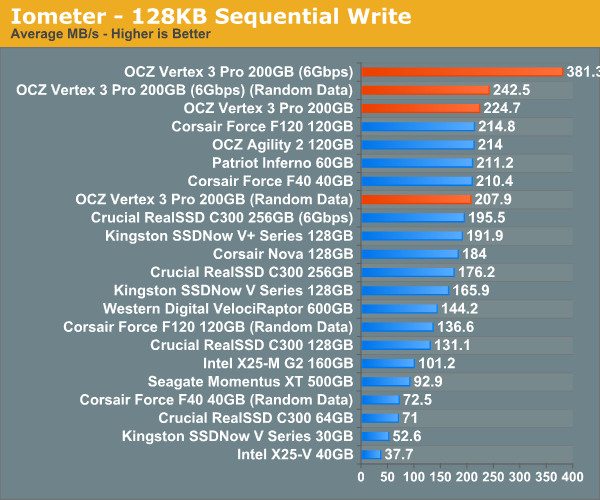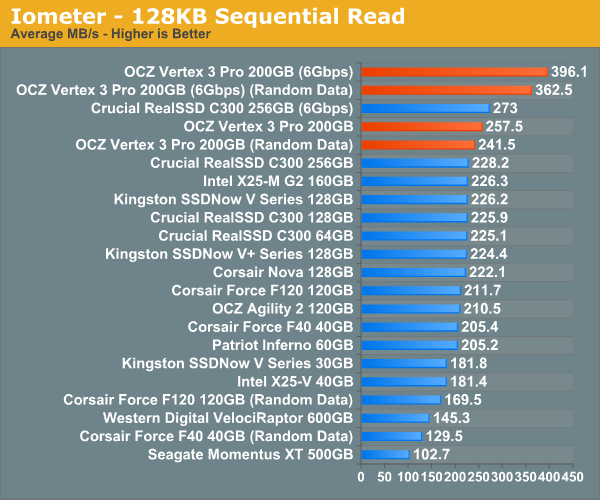OCZ Vertex 3 Pro Preview: The First SF-2500 SSD
by Anand Lal Shimpi on February 17, 2011 3:01 AM ESTSequential Read/Write Speed
To measure sequential performance I ran a 3 minute long 128KB sequential test over the entire span of the drive at a queue depth of 1. The results reported are in average MB/s over the entire test length.

This is pretty impressive. The new SF-2500 can write incompressible data sequentially at around the speed the SF-1200 could write highly compressible data. In other words, the Vertex 3 Pro at its slowest is as fast as the Vertex 2 is at its fastest. And that's just at 3Gbps.
The Vertex 3 Pro really shines when paired with a 6Gbps controller. At low queue depths you're looking at 381MB/s writes, from a single drive, with highly compressible data. Write incompressible data and you've still got the fastest SSD on the planet.
Micron is aiming for 260MB/s writes for the C400, which is independent of data type. If Micron can manage 260MB/s in sequential writes that will only give it a minor advantage over the worst case performance of the Vertex 3 Pro, and put it at a significant disadvantage compared to OCZ's best case.
Initially, SandForce appears to have significantly improved performance handling in the worst case of incompressible writes. While the old SF-1200 could only deliver 63% of its maximum performance when dealing with incompressible data, the SF-2500 holds on to 92% of it over a 3Gbps SATA interface. Remove the SATA bottleneck however and the performance difference returns to what we're used to. Over 6Gbps SATA the SF-2500 manages 63% of maximum performance if it's writing incompressible data.
Note that the peak 6Gbps sequential write figures jump up to around 500MB/s if you hit the drive with a heavier workload, which we'll see a bit later.

Sequential read performance continues to be dominated by OCZ and SandForce. Over a 3Gbps interface SandForce improved performance by 20 - 40%, but over a 6Gbps interface the jump is just huge. For incompressible data we're talking about nearly 400MB/s from a single drive. I don't believe you'd even be able to generate the workloads necessary to saturate a RAID-0 of two of these drives on a desktop system.










144 Comments
View All Comments
eva2000 - Thursday, February 17, 2011 - link
Thanks for the review, curious why the 256GB Crucial RealSSD C300 only included in some benchmarks and not others ?Anand Lal Shimpi - Thursday, February 17, 2011 - link
That's simply a data entry issue, I'll get it fixed :)Take care,
Anand
therealnickdanger - Thursday, February 17, 2011 - link
Also, I'm curious as to why none of the REVO benchmarks are included? On the one hand, I understand how niche PCIe drives may be, but on the other, they can offer significant performance over both SATA 3Gbps and 6Gbps drives. It would be nice to see the new Heavy and Light benchmarks applied to those as well.ludikraut - Thursday, February 17, 2011 - link
+1 on including REVO drive results in the drive comparisons.markjx1 - Thursday, February 17, 2011 - link
because REVO drives are garbage. they're nothing more than a bunch of vertex2's slapped onto a board with a cheap Silicone Image controller that has a PCI-X to PCIe bridge. Resale value on REVO is crap and if one of the drives dies, you have a nice paperweight.bji - Thursday, February 17, 2011 - link
Your own personal opinion on the drives are not a reason to disclude them from the review.therealnickdanger - Thursday, February 17, 2011 - link
Garbage that can pull down 800MB/s...? Go away, troll. For users without SATA 6Gbps, it's a very practical solution to achieve huge speed. In fact, even people WITH SATA 6Gbps would get a boost. The cost/GB is even under $2 for some of the REVOs, making them a reasonable alternative.Anand Lal Shimpi - Thursday, February 17, 2011 - link
All graphs should now have the 256GB C300 in them :)Breogan - Thursday, February 17, 2011 - link
Is the data in the Incompressible Write Speed Test mixed for the SF2500 drive or does it perform actually worse after trim?. It seems weird to me that a dirty drive performs as if it was stock and the trim actually worsens its perfomance.Anand Lal Shimpi - Thursday, February 17, 2011 - link
It's not TRIM that is making the drive slower, it's the next write pass that's actually pushing the drive into a lower performance state as there's more garbage collection/cleaning that's going on. If I hadn't TRIMed and just ran another pass of the AS-SSD test you'd see the same number.Take care,
Anand